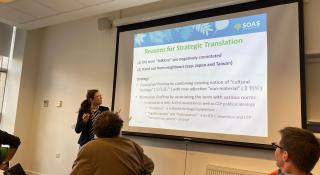
Breadcrumbs navigation
Second annual climate negotiation simulation takes place at Goodenough College
On Wednesday 26 April 2023, the second annual BISA climate negotiation simulation took place at Goodenough College in London. The aim was to engage students in a topical and important issue, and to raise their awareness of the international politics of climate change.
The climate simulation reproduces the negotiations held under the auspices of the United Nations. Students represented one of the ‘parties’ (i.e. states) that have signed up to current international agreements on climate change (such as the Paris Agreement of 2015 and the Glasgow Climate Pact of 2021). Using these agreements as a starting point, the simulation was geared toward achieving reductions in global greenhouse gas emissions, generating a fund to finance climate transition finance, and agreeing on a statement of principles. This year students from 15 UK universities took part - more than double the number in 2022.
Milly Phillips, a student participant from Aberystwyth University, said:
“I enjoyed the way we were briefed with materials beforehand so that we could come having done a good amount of prior research The activities we simulated were well-received by me and my peers. For example, I really liked the reality of the event and how we could see how it could play out in real-life negotiations. This event was beneficial to my skill set as a student of IR because of my likely career prospects that will largely tie into the types of problems we discussed and tackled. In particular, I can see how this event will positively improve my debating, communication and confidence skills.”
The climate negotiation is modelled on a simulation designed by Mark Webber (University of Birmingham and Honorary President of BISA), and run in Birmingham schools as part of the November 2021 ESRC Festival of Social Science. Mark said:
“This group of students were particularly impressive. There are three tasks to get through and often the first task, which has three parts, has to be curtailed because the negotiations have failed or taken more than the available time. This cohort managed to complete all tasks.”
The day began with a keynote from Carne Ross, the founder of Independent Diplomat and Spokesperson for Global Solidarity, Green Party of England and Wales. Carne talked about climate change generally, and gave the students some pointers on good negotiation.
At the end of the day, awards were presented for Distinguished and Outstanding delegations. The delegation representing the UK, (Aberystwyth University), and the delegation representing the EU (De Montfort) were the deserved recipients. All participants received a certificate to commemorate their involvement.
To find out more about what was involved, how the students prepared, and the skills they developed, read this case study by participant Felix Smart, and watch the videos below.


